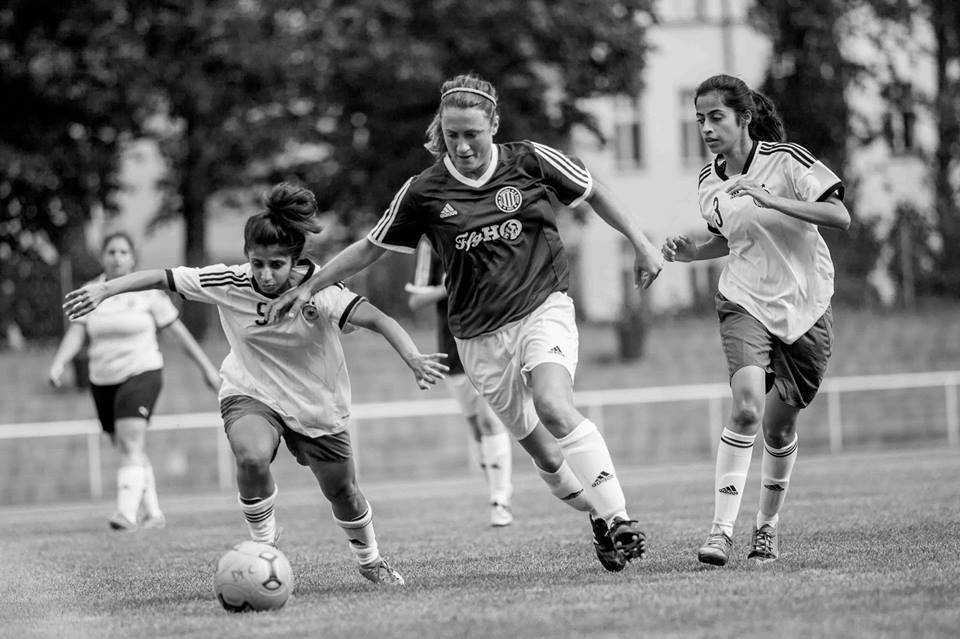
 Iranian fans in 2006. PHOTO COURTESY: DISCOVER FOOTBALL/ DANA ROSIGER
Iranian fans in 2006. PHOTO COURTESY: DISCOVER FOOTBALL/ DANA ROSIGERA decade later, the Iranian national team got the chance to step on to a German pitch again to complete the unfinished match, to play the second leg. However, this time again the result (4-2 in favour of Germany) mattered little; the women of Iran were not being morally policed, a big achievement in itself.
Burying prejudice in football one kick at a time
 Iranian team being cheered by Iranian fans in Germany. PHOTO COURTESY: DISCOVER FOOTBALL/ DANA ROSIGER
Iranian team being cheered by Iranian fans in Germany. PHOTO COURTESY: DISCOVER FOOTBALL/ DANA ROSIGER Iranian national women's team. PHOTO COURTESY: DISCOVER FOOTBALL/ DANA ROSIGER
Iranian national women's team. PHOTO COURTESY: DISCOVER FOOTBALL/ DANA ROSIGERThe Iranians weren’t the only ones to have felt liberated, the Afghans and Pakistanis felt the same. Earlier this month, footballers from 11 different countries were invited to play at the all-women ‘Discover Football’ festival. Players from Afghanistan, France, Greece, Italy, Pakistan, Kenya, Libya, Palestine, Saudi Arabia, Sudan and Turkey participated in the event.
 Khadija coaching her team. PHOTO COURTESY: DISCOVER FOOTBALL/ DANA ROSIGER
Khadija coaching her team. PHOTO COURTESY: DISCOVER FOOTBALL/ DANA ROSIGERThe sports festival that ran from August 29 to September 5 had more to it than just football. It was the continuation of a game which was left incomplete. It was an intercultural exchange of life experiences where the common language was football.
These young women get a real ‘kick’ out of levelling the playing field
The exact number of participants was expected to be 100; however, the tally in the end was 104 female footballers. Four Pakistani players from Karachi United also made it to the international arena.
 Marina listening to her coach during training. PHOTO COURTESY: DISCOVER FOOTBALL/ DANA ROSIGER
Marina listening to her coach during training. PHOTO COURTESY: DISCOVER FOOTBALL/ DANA ROSIGERThe club named four of its players - Khadija Kazmi, Sarah Ali, Nina Zehri and the author of this feature - to represent them and the country in the festival.
 Marina showing Angela Merkel the flag of Pakistan. PHOTO COURTESY: DISCOVER FOOTBALL/ DANA ROSIGER
Marina showing Angela Merkel the flag of Pakistan. PHOTO COURTESY: DISCOVER FOOTBALL/ DANA ROSIGERSince the entire team couldn’t make it to the festival due to technical issues, the four players were asked to play in teams which had a mixed caucus. The teams received training every day before they participated in their friendly matches.
 Marina with her team. PHOTO COURTESY: DISCOVER FOOTBALL/ DANA ROSIGER
Marina with her team. PHOTO COURTESY: DISCOVER FOOTBALL/ DANA ROSIGERMy team included French and Kenyan women; Khadija played alongside women from Sudan and Turkey, while Nina and Sarah played with the Palestinians and a Saudi national. For eight days, the teams spent most of their time training and playing.
 Nina and Sarah (center) from Pakistan. PHOTO COURTESY: DISCOVER FOOTBALL/ DANA ROSIGER
Nina and Sarah (center) from Pakistan. PHOTO COURTESY: DISCOVER FOOTBALL/ DANA ROSIGER“It was very memorable for me since I scored a winning goal for my team,” said 23-year-old Nina who has been playing for Karachi United since 2010. “I was physically the smallest in the team so they picked me up and threw me in the air a few times.”
 Nina from Pakistan scores for her team. PHOTO COURTESY: DISCOVER FOOTBALL/ DANA ROSIGER
Nina from Pakistan scores for her team. PHOTO COURTESY: DISCOVER FOOTBALL/ DANA ROSIGERNina added: “I felt I stunned many people who thought Pakistani women couldn’t play football."
 Nina from Pakistan. PHOTO COURTESY: DISCOVER FOOTBALL/ DANA ROSIGER
Nina from Pakistan. PHOTO COURTESY: DISCOVER FOOTBALL/ DANA ROSIGERSarah felt connected to her team and the festival renewed her passion for the sport. “The best part about being there was realising there are other women struggling with some similar issues and some completely different issues. It gave me new-found motivation to continue to struggle and persevere,” she said.
 Nina and Sarah trying to keep possession. PHOTO COURTESY: DISCOVER FOOTBALL/ DANA ROSIGER
Nina and Sarah trying to keep possession. PHOTO COURTESY: DISCOVER FOOTBALL/ DANA ROSIGERDuring the visit, the players met German Chancellor Angela Merkel, which underlined the importance of the game and the players from other countries.
Road to Anfield: Karachi United to represent Pakistan in Liverpool
Women from countries such as Sudan and Afghanistan explained how they had to play football secretly in their countries. “Women and football do not go together in my country. Girls are expected to be docile and soft,” explained Sarah Jubara from Sudan.
 Sarah Jubara from Sudan. PHOTO COURTESY: DISCOVER FOOTBALL/ DANA ROSIGER
Sarah Jubara from Sudan. PHOTO COURTESY: DISCOVER FOOTBALL/ DANA ROSIGER“In Sudan, women cannot play football in public places,” said Jubara, adding that her team plays the sport in halls behind closed doors in secret. She added that sometimes they secretly played with supportive male footballers.
The case is nearly the same with the Afghans, where players would have to book gymnasiums and pack up 15 minutes before their time so that the men won’t see them play.
 Players of Karachi United who visited Germany
Players of Karachi United who visited GermanyThe problems faced by these women felt close to home and heart. Hardly any facilities for women to play football exist - be they outdoor or indoor.







1731498407-0/cover_1731497052FotoJet-(27)1731498407-0-270x192.webp)









COMMENTS (5)
Comments are moderated and generally will be posted if they are on-topic and not abusive.
For more information, please see our Comments FAQ